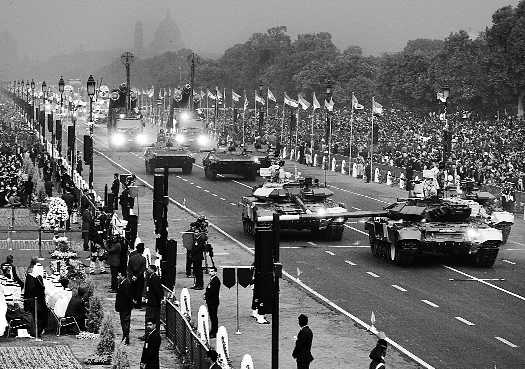I was in my second year History (Hons) in 1950 at St. Stephen’s College that 26th Jan. What a parade it was!

Photo: Mukesh Aggarwal
ON midnight of 14-15 August 1947, India attained independence, but as a Dominion, accepting the British King as the Emperor of India. This changed on January 26, 1950, when India became a Republic and the King was no longer Emperor of India. Incidentally, the resolution of the Congress Working Committee accepting the Partition was sent to the AICC. On Gandhiji’s pleading, the AICC passed the CWC resolution supporting the Partition by 157 for, 29 against, 32 neutral. That is how history is sometimes made.The Republic Day Parade this Thursday was threatened by thunder and menacing dark clouds. The gods held up the torrential rain till after the parade. I was in my second year History (Hons) in 1950 at St. Stephen’s College that 26th Jan. What a parade it was! President Dr Rajendra Prasad sat in the ceremonial coach escorted by the President’s Bodyguard (my elder brother was adjutant). The coach rode through Connaught Place, and finally, arrived at Irwin Stadium (now Shivaji Stadium) where a parade was held. Thanks to my brother I got a pass both for the parade and the President’s Reception at Rashtrapati Bhavan — no longer the Viceregal Lodge. I was most excited to see at close quarters President Prasad, the PM and Deputy PM, Maulana Azad and others. Is the Republic Day parade necessary? Crores are spent and it is over in 90 minutes. Apart from a grand and colourful spectacle, the parade has immense symbolic value. Also, it is a reminder that what is right with India is infinitely greater than what is wrong with India. Above all, it is a joyful day. The night glows with the illuminated Rashtrapati Bhavan, South Block, North Block, Parliament House and India Gate. It is wonderful sight.To organise such a vast undertaking involves thousands of people. They do a splendid job, working round-the-clock. We must not forget them. CRRID – the Centre for Research in Rural and Industrial Development — has its office in Chandigarh. The man behind establishing CRRID was PN Haksar, a man of towering intellect and luminous integrity. I looked upon him as a Guru.I am a member of the executive committee of CRRID. I infrequently attend the meetings of the executive. When I do, my interventions are not memorable. A few months ago, I sent my resignation to the energetic Rashpal Malhotra, the moving spirit behind CRRID and a friend of longstanding. He promptly turned down my resignation. This is a good example of the rigorous enforcement of the wishes of the Director General.CRRID does admirable work, invites scholars from various parts of the world to lecture and participate in CRRID seminars. I read the magazine, Man and Development regularly, partly to educate myself and on very rare occasions, use it as a sleeping pill (No offence meant).In the December 2016 issue, Manmohan Singh’s address to the IASSI (Indian Association of Social Science Institutions) is reproduced. Manmohan is not only erudite but a gentleman-politician and an inspiring teacher. He takes a lot of interest in the activities of CRRID. As I write this our Pekinese has put his front legs on the right arm of my chair and pulling at my sleeve. We have named him Li Po after the great Chinese poet. We acquired him when he was six weeks old. He was like a woolly little doll. Utterly irresistible.Now he is almost in his sixth year. Disobedient, it overeats, sulks when denied some eatables he wants. In some ways the little fellow runs our lives. Actually he is adorable, loyal and affectionate. And also sensitive. When he sees members of our staff packing a couple of suitcases, Li Po immediately knows that his masters are going somewhere, leaving him alone. He becomes almost tearful and immobile. It is painful to watch him suffer. When abroad, we telephone our private secretary to enquire how ‘master’ Li Po is? He is doing fine. He is taken for a walk in the park where he wants to take on dogs three times his size. Their indifference deflates him.He has now taken to catching pigeons in our little garden. Most of the time, he fails to catch even one. The other day he did. He walked into our sitting room, triumphantly with a pigeon in his mouth. By now Mr. Pigeon was the late Mr. Pigeon. Lip Po has breakfast, lunch, afternoon tea and dinner with us. He has not yet learned to use forks and knives. He is a strict vegetarian (he does not eat the birds he kills) a teetotaller (so we think). He hates being bathed. The ritual is performed twice a week.We have installed a lift in our home. Li Po insists in using the lift with us. Sometimes he refuses to get out and has to be bribed with a biscuit. Whatever would we do without Li Po?Alexander Sasha Kadakin was an outstanding, warm-hearted and skilful diplomat. He served the Soviet Union as a loyal diplomat and Russia with great distinction. Yes, India was his second home. Fluent in Hindi and English, he mixed with ease in diplomatic and non-diplomatic gatherings. We had known each other for over 32 years. It was a friendship I deeply cherished and valued (Kadakin died in Delhi on Thursday).
